Proton pump inhibitors (PPIs) [Omeprazole, Lansoprazole, Pantoprazole, and Rabeprazole] are among the most frequently prescribed medications in the United States. PPIs are most commonly used for the prevention and treatment of gastroesophageal reflux disease (GERD) and esophageal/duodenal/stomach ulcers. These medications result in an irreversible inhibition of the proton pump in gastric parietal cells, thereby suppressing gastric acid secretion. Recently, there have been numerous reports suggesting that patients taking PPIs may be predisposed to compromised bone hemostasis and an increased dental implant complication rate.
PPIs EFFECTS ON BONE:1
- Impairs calcium absorption via decreased stomach acid
- Reduces osteoclast activity
- Decreases osteoclastic differentiation mediated by osteoblasts
- Impedes collagen cross-linking
- Increases parathyroid hormone levels which increases calcium release from the bone (decreases bone density)
PPIs EFFECTS ON DENTAL IMPLANTS:
Decreased Bone Density: Al Subaie et al.2 concluded that the use of PPIs results in a decreased bone mineral content, thinner cortical bone, and decreased bone-implant contact.
Increased Crestal Bone Loss: Ursomanno et al. 3 reported that PPI medications are associated with greater crestal alveolar bone loss at implant sites resulting in increased implant thread exposure.
Increased Failure Rate: Wu et al.4 in a cohort study showed twice the failure rate of dental implants with patients taking PPIs. Chrcanovic et al.5 reported a threefold difference in im-plant failure between PPI and non-PPI users.
Compromised Bone Regeneration: Xe et al.6 concluded that PPIs reduce calcium availability by increasing the pH in the small intestine. This has been shown to accelerate bone loss and negatively affects bone regeneration.
CONCLUSIONS
Patients presenting for dental implants which are taking PPIs are not contraindicated from having dental implants. However, because of the reported detrimental effects PPIs have on bone, it is advisable to inform patients of the increased risk for dental implant complications. Clinicians should emphasize the importance of more frequent maintenance appointments and reduction of parafunctional habits.
- Altay, Mehmet Ali, et al. “Proton pump inhibitor intake negatively affects the osseointegration of dental implants: a retrospective study.” Journal of the Korean Association of Oral and Maxillofacial Surgeons 45.3 (2019): 135-140.
- Al Subaie A, 2016. Systemic administration of omeprazole interferes with bone healing and implant osseointegration: an in vivo study on rat tibiae. J Clin Periodontol. 43:193–203.
- Ursomanno, , et al. “Effect of Proton Pump Inhibitors on Bone Loss at Dental Implants.” International Journal of Oral & Maxillofacial Implants 35.1 (2020).
- Wu, Xixi, et al. “Proton pump inhibitors and the risk of osseointegrated dental implant failure: a cohort study.” Clinical implant dentistry and related research 19.2 (2017): 222-232
- Chrcanovic, (2017). Intake of Proton Pump Inhibitors Is Associated with an Increased Risk of Dental Implant Failure. The International Journal of Oral & Maxillofacial Implants, 32(5), 1097–1102.
- Ye X2011. Proton pump inhibitors therapy and risk of hip fracture: systematic review and meta-analysis. Eur J Gastroenterol Hepatol. 23:794–800.
